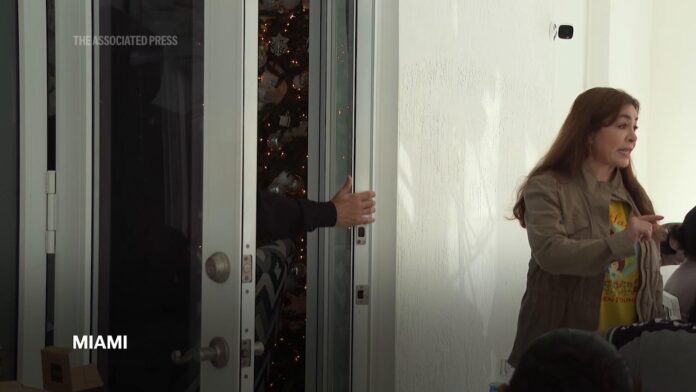Parents gathered around Nora Sanidgo’s huge, rectangular dining table for lunch before signing paperwork designating the Nicaraguan immigrant as their children’s legal guardian, entrusting them to her if they are deported. She provided a list of items to bring with them, including birth certificates, medical and school records, immigration paperwork, and her phone number.
“Talk to your children and tell them what can happen, let them have my phone number on hand, let them learn it, let them record it,” Sandigo was quoted as saying Sunday.
For the gathering at Sandigo’s southwest Miami house, as well as millions of others in the United States illegally or with temporary legal status, the start of Donald Trump’s second term as president on Monday brings with it the fear that their time in the country may be cut short. Trump campaigned on mass deportations and promised a slew of executive actions to overhaul immigration policy.
“You don’t have to be afraid, you just have to be prepared,” Sandigo told a group of about 20 people, including young children, who were watching a demonstration of how to respond if immigration authorities knocked on their door. “Take precautions wherever you are.”
Sandigo, who moved to the United States in 1988, has volunteered to care for more than 2,000 children in 15 years, including at least 30 since December. A notary was present on Sunday.
Erlinda, a single mother from El Salvador who came in 2013, filed legal documents for her two U.S.-born children, aged 10 and 8. She stated that she sought for asylum but does not know the status of her case.
“I am afraid for my children, that they will live in terror of not seeing their mother for a day, a month, or a year,” said Erlinda, 45, who requested to be named only by her first name due to worries of detention.
Plans for deportation arrests looked to be in disarray as reports of an operation in Chicago broke this week. On Fox News Sunday, Trump’s “border czar” Tom Homan stated that Chicago was “not off the table, but we’re reconsidering when and how we do it.” He said the disclosure prompted worries about police safety.
So-called sanctuary towns, which limit local police cooperation with federal immigration officials, have been a favorite Trump target, particularly Chicago. Reports that his first push will be in the country’s third-largest city fueled a renewed feeling of urgency and terror.
Chicago became a sanctuary city in the 1980s and has strengthened its rules subsequently, especially when Trump took office in 2017. Last Monday, the City Council flatly rejected a long-shot proposal letting local police to collaborate with Immigration and Customs Enforcement officers on deportation cases involving persons charged or convicted of crimes.
The Rev. Homero Sanchez said he had no idea the level of dread in the Chicago immigrant community he represents until someone asked him to manage the sale of their family’s home and other finances if they were picked up after Trump took office.
“They believe they have been targeted for who they are. Sanchez, who serves the St. Rita of Cascia Parish on Chicago’s South Side, stated that they feel as if they are recreating a terror from eight years ago. “They believe something is about to happen. This is no longer their city due to the danger.”
Sanchez, whose congregation has primarily comprised of persons of Mexican heritage since the 1980s, dedicated Sunday Mass “to solidarity with our immigrant brothers and sisters.”
Cardinal Blase Cupich, archbishop of Chicago, said stories of immigration officials targeting the city were “not only profoundly disturbing but also deeply wounding.”
“We are proud of our immigration legacy that continues to renew the city we love,” Cupich said Sunday during a visit to Mexico City, according to a copy of his prepared remarks.
ICE arrests a small percentage of its targets during street operations, but Trump is anticipated to cast a broader net than President Joe Biden, whose focus on picking up people away from the border was mostly restricted to those with significant criminal records or who represent a threat to national security.
Biden’s administration also discontinued the practice of large workplace arrests, which had been widespread under Trump, including a 2019 operation targeting Mississippi poultry facilities.
Trump advisors have stated that immigration agents will arrest non-targets, such as wives or roommates, who are in the country illegally.
